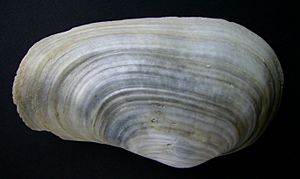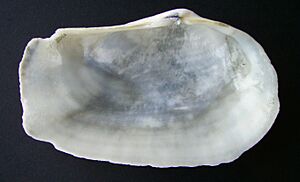Deepwater clam facts for kids
Quick facts for kids Deepwater clam |
|
|---|---|
 |
|
| Scientific classification | |
| Synonyms | |
|
Panopaea zelandica Quoy and Gaimard, 1835 |
The Panopea zelandica is a really big type of clam! It's often called the deepwater clam or New Zealand geoduck. Sometimes people also call it a king clam or a gaper. It gets the name "gaper" because its shell doesn't completely close at either end.
This amazing creature is a bivalve mollusc. That means it's a soft-bodied animal, like a snail or an octopus, but it lives inside a shell made of two hinged parts, like a book. It belongs to the Panopea family, which includes other geoduck clams.
Contents
Where the New Zealand Geoduck Lives
The New Zealand geoduck is found all around the main islands of New Zealand. You can find it near the North, South, and Stewart islands.
Its Home in the Ocean
These clams usually live in shallow ocean waters. They prefer sandy or muddy areas off sandy beaches. You'll typically find them in depths of about 5 to 25 metres (about 16 to 82 feet).
Other Geoduck Species
Did you know there's another type of geoduck in New Zealand? It's called Panopea smithae. This cousin lives in much deeper waters than the New Zealand geoduck.
How the Geoduck Lives
Like other geoducks, the P. zelandica is a master at burrowing. It digs deep down into the mud or sand. It can burrow quite far, sometimes up to 45 centimetres (about 18 inches) deep!
Using its Siphon
Even though it's buried deep, the geoduck needs to reach the surface for food and water. It does this using a special tube called a siphon. This siphon stretches up from its body to the ocean floor.
How it Eats
The siphon is very clever because it has two tubes inside. One tube sucks in water from the ocean. This water contains tiny bits of food, like plankton. The clam filters out these food particles. Then, the clean water is pushed back out through the other tube of the siphon. It's like a built-in vacuum cleaner for food!



